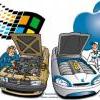Nu stiu ce numesti tu "solid", ca mai solid ca benzinaru nu poate exista vre-un motor. Crede-ma ca gresesti rau. Insasi principiul de functionare face ca dieselul sa lucreze in conditii mult mai dure decit benzinarele.
Tocmai pt. că un diesel lucrează în condiţii grele, e mai solid construit. Nu ştiu cum tocmai tu poţi spune că nu e.
The higher compression ratios of the
diesel cycle demand a much stronger block, head,
and almost all moving parts in general. These
stronger parts add a lot of weight, or a lot of
expense, especially if lighter alloys are being used.
Cata tu ori nu intelegi ori te faci ca nu intelegi. Relu nu a zis ca un diesel nu e facut mai solid, ci ca e mai solid tocmai din cauza presiunilor mai mari...
Poate nu citim acelaşi forum.
Relu a şi susţinut s-a şi contrazis şi apoi a mai susţinut o dată că e mai solid.
De fapt şi tu ai spus asta mai sus, nu ştiu ce ai cu motorul diesel.
Deci părerea mea care este e că citim forumuri diferite.
Advantages of diesel engines
Fuel economy: Diesel cars can easily approach the fuel economy of a hybrid without resorting to mileage-boosting devices such as auto shut-off systems and low rolling resistance tires.
Torque: Diesels produce large amounts of torque (pulling power) at low engine speeds; a small four-cylinder diesel can easily produce as much torque as a larger six-cylinder gasoline engine. This strong mid-range torque gives diesel cars excellent passing power. Horsepower ratings for diesels tend to be lower, because horsepower is a function of speed and diesels tend to have a lower redline (maximum operating speed) than gasoline engines. Diesels are built from heavier-duty components and therefore cannot spin as fast.
Older diesels produced the bulk of their power only at low engine speeds, which made for slow acceleration. Modern diesels are turbocharged, which allows them to produce power over a broader RPM range.
Longevity: Diesels are less prone to wear than gasoline engines. Heavy-duty truck engines will often run a million miles between overhauls, and diesel cars often run well past 300,000 miles with no major engine problems.
Alternative fuels: Unlike gasoline engines, diesels can run on non-petroleum-based fuel (biodiesel) with no major modifications. Many manufacturers support operation on biodiesel mixes up to 20% (20% biodiesel/80% petroleum-based diesel) without voiding the manufacturer's warranty; however many diesel owners run 100% biodiesel with no problems. Diesels can be converted to run on pure vegetable oil with only minor modifications.
Safety: Diesel fuel is less volatile than gasoline, and will only ignite under severe pressure and/or very high temperatures. That makes diesel fuel safer to handle, and reduces the chance of a fire or explosion should the fuel tank rupture in a crash.
Disadvantages of diesel engines
Noise: Unlike gasoline engines, which produce most of their noise from the easily-muffled exhaust system, most diesel noise comes from the engine itself. Diesel vehicles employ lots of sound insulation to soften the characteristic diesel clatter.
Expense and weight: Diesel engines employ much higher compression ratios than gasoline engines; they compress combustion air to about 1/25th of its original volume (as opposed to gasoline engines, which compress their fuel-air mixtures to around 1/8th to 1/10th of its original volume). Therefore, they must be stronger than gasoline engines, which makes them heavier and more expensive to build. Diesels also use high-pressure direct-fuel-injection systems, which require beefier (and more expensive) components than the indirect-injection systems used in gas engines.
Emissions: Though the diesel engine was invented well over a century ago, diesel emissions technology is still in its infancy. Several modern-day diesel cars rely on "AdBlue", a urea-based solution that provides ammonia to reduce the diesel engine's emissions; these cars have a tank which must be refilled every 10,000 miles or so.
Messy fuel: Diesel fuel is greasy, smelly, and can be difficult to wash off of hands or clothes. (Some diesel owners carry gloves to wear while refueling.) Diesel fuel doesn't evaporate as readily as gasoline, so the ground around diesel pumps is often slick, and tracking diesel fuel into the car can make the interior smell bad.
Smoke: Diesel vehicles have a reputation of being smoky, smelly, and slow, a throwback to the low-tech diesels found in many trucks. (In truth, smoky diesel exhaust is usually a sign of a dirty air filter or an improperly-adjusted mechanical fuel injection system.)
Cam asta era percepţia, dar s-au schimbat destul de multe, unele fiind recente, anul trecut abia, altele de câţiva ani.
La zgomot s-au antifonat mai bine masinile sau nu. La golf de ex pe mine nu mă deranja.
Au devenit aproape la fel de eficiente la costuri ca un benzinar dacă mergi mult sau le soliciţi mai tare.
Emisiile anul trecut au fost rezolvate de către Audi. Vor urma şi alte mărci.
"Messy" e pt. camioane
Fumul a fost eliminat şi el la noile generaţii.
Viitorul e oricum pe baza de hidrogen, nu electric. În ţările nordice dacă vă duceţi, vedeţi că se lucrează la "autostrăzile hidrogenului", adică statul pregăteşte staţii de alimentare pe sute de km. Dar legat de poluare in sine, NIMIC nu cade din cer, NIMIC nu se face fără poluare. Doar preţul va fi mai mic.



















